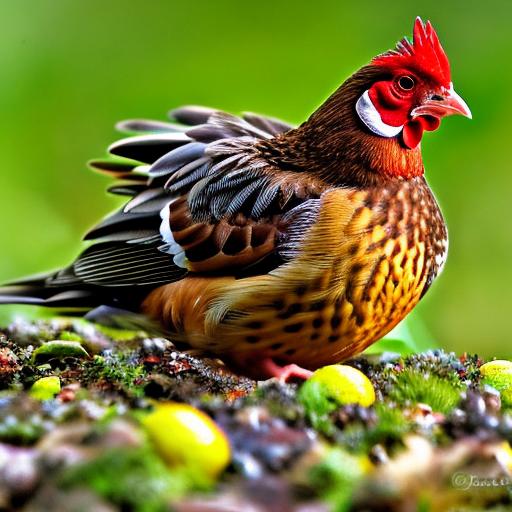Keeping chickens in the backyard has become an increasingly popular trend in recent years. What was once a common practice in rural areas has now made its way into suburban and even urban neighborhoods. The history of backyard chicken keeping dates back centuries, with families raising chickens for their eggs and meat. However, in recent years, there has been a resurgence of interest in this age-old practice.
There are several reasons why keeping chickens at home has become more popular. Firstly, people are becoming more conscious of where their food comes from and are looking for ways to have more control over their food supply. Raising chickens allows individuals to have a constant supply of fresh eggs, which are not only healthier but also tastier than store-bought eggs. Additionally, keeping chickens is a sustainable practice that reduces food waste and promotes self-sufficiency.
Key Takeaways
- Keeping chickens at home is a growing trend that offers many benefits.
- Raising chickens in your back garden can provide fresh eggs and fertilizer.
- It’s important to understand the legalities of keeping chickens in residential areas.
- Choosing the right chicken breeds and setting up a safe coop are crucial for success.
- Feeding, caring for, and managing health and odor issues are all part of responsible chicken ownership.
The Benefits of Raising Chickens in Your Back Garden
One of the main benefits of raising chickens in your back garden is the availability of fresh eggs. Store-bought eggs can be weeks old by the time they reach your kitchen, whereas backyard eggs are typically laid just hours before consumption. These eggs are not only fresher but also have a richer flavor and brighter yolks due to the chickens’ varied diet.
Another benefit of keeping chickens is the natural fertilizer they provide for your garden. Chicken manure is high in nitrogen, phosphorus, and potassium, making it an excellent source of nutrients for plants. By allowing your chickens to roam freely in your garden or using their manure as compost, you can improve soil fertility and promote healthy plant growth.
Chickens also serve as natural pest control agents. They eat insects, slugs, and other pests that can damage your plants or spread diseases. By allowing your chickens to forage in your garden, you can reduce the need for chemical pesticides and create a more balanced ecosystem.
Raising chickens in your backyard can also be an educational experience, especially for children. It teaches them about the responsibility of caring for animals, the importance of sustainable practices, and the cycle of life. Children can learn about the different breeds of chickens, their behaviors, and their needs. It also provides an opportunity for children to observe the hatching of eggs and witness the growth and development of chicks.
Understanding the Legalities of Keeping Chickens in Residential Areas
Before embarking on backyard chicken keeping, it is essential to understand the legalities involved. Different cities and neighborhoods have varying regulations regarding the keeping of chickens in residential areas. Some may have restrictions on the number of chickens allowed, coop size and placement, noise levels, and even whether roosters are permitted.
To ensure compliance with local laws and regulations, it is crucial to research and familiarize yourself with the specific rules in your area. This can typically be done by contacting your local government or zoning department or checking their website for information on urban agriculture or backyard chicken keeping.
In some cases, obtaining permits may be necessary to keep chickens legally. These permits may require inspections of your coop and property to ensure that it meets safety and hygiene standards. It is important to follow these procedures to avoid any legal issues or fines.
Additionally, it is essential to be mindful of zoning and noise ordinances when keeping chickens in residential areas. Some neighborhoods may have restrictions on noise levels or require a certain distance between coops and neighboring properties. Being considerate of your neighbors’ concerns can help maintain a positive relationship within the community.
Choosing the Right Chicken Breeds for Your Back Garden
When choosing chicken breeds for your back garden, several factors need to be considered. The climate in your area plays a significant role in determining which breeds will thrive. Some breeds are better suited for colder climates, while others are more heat-tolerant. It is important to choose breeds that can withstand the temperature extremes in your region.
The amount of space available in your backyard is another crucial factor to consider. Some breeds require more space to roam and forage, while others are content in smaller areas. It is important to provide enough space for your chickens to exercise and exhibit natural behaviors.
Egg production is another consideration when choosing chicken breeds. Some breeds are known for their high egg production, while others are more suitable for meat production. If your main goal is to have a constant supply of fresh eggs, it is advisable to choose breeds that are known for their egg-laying abilities.
Temperament is also an important factor, especially if you have children or pets. Some breeds are known to be docile and friendly, while others can be more aggressive or flighty. It is important to choose breeds that are known for their calm and friendly nature, especially if you plan on interacting with your chickens regularly.
Some popular chicken breeds for backyard chicken keeping include the Rhode Island Red, Sussex, Plymouth Rock, and Australorp. These breeds are known for their hardiness, adaptability to various climates, and high egg production. They are also generally friendly and easy to handle, making them suitable for families with children.
Setting Up a Safe and Comfortable Chicken Coop
A safe and comfortable chicken coop is essential for the well-being of your backyard chickens. The coop should provide protection from predators, shelter from the elements, and adequate space for the chickens to move around.
When choosing a location for your coop, it is important to consider factors such as sunlight exposure, drainage, and proximity to neighbors. The coop should receive ample sunlight during the day but also have shaded areas for the chickens to seek refuge from the heat. It should be placed on well-drained ground to prevent flooding or waterlogging.
You have the option of building your own coop or purchasing a pre-made one. If you choose to build your own, there are numerous plans and designs available online or in books that can guide you through the process. Building your own coop allows for customization and can be a fun DIY project. However, if you are not confident in your carpentry skills, purchasing a pre-made coop is a convenient option.
The coop should provide enough space for the number of chickens you plan to keep. As a general rule of thumb, each chicken should have at least 4 square feet of indoor space and 10 square feet of outdoor space. It is important to provide adequate ventilation to prevent the buildup of moisture and ammonia from chicken waste.
Feeding and Caring for Your Backyard Chickens

Proper nutrition and hydration are essential for the health and well-being of your backyard chickens. A balanced diet ensures that they receive all the necessary nutrients for growth, egg production, and overall health.
A commercial chicken feed formulated specifically for laying hens is a good base for their diet. This feed contains the necessary vitamins, minerals, and protein required for egg production. In addition to commercial feed, chickens can also be fed kitchen scraps such as fruits, vegetables, and grains. However, it is important to avoid feeding them anything toxic or harmful, such as chocolate, onions, or avocado.
Fresh water should always be available to your chickens. They require clean water for hydration and to aid in digestion. Waterers should be cleaned regularly to prevent the buildup of bacteria or algae.
In addition to feeding, chickens require daily care and maintenance. This includes cleaning the coop to remove waste and soiled bedding, collecting eggs, and checking on the chickens’ overall health. Regular cleaning helps prevent the spread of diseases and keeps the coop smelling fresh.
Dealing with Common Health Issues in Chickens
Like any other animal, chickens can fall ill from time to time. It is important to be able to recognize the signs of illness and take appropriate action to prevent the spread of disease and ensure the well-being of your flock.
Some common signs of illness in chickens include lethargy, loss of appetite, abnormal droppings, respiratory distress, and changes in behavior. If you notice any of these signs, it is important to isolate the sick chicken from the rest of the flock to prevent the spread of disease.
Common ailments in chickens include respiratory infections, parasites (such as mites or lice), and egg-laying issues. Treatment for these ailments may vary depending on the severity and nature of the condition. In some cases, over-the-counter remedies or natural remedies may be sufficient. However, if the condition persists or worsens, it is advisable to seek veterinary care.
Preventative measures such as regular health checks, proper nutrition, and good hygiene practices can help reduce the risk of illness in chickens. It is important to keep the coop clean and dry, provide a balanced diet, and monitor the chickens’ behavior and overall health.
Managing Noise and Odor Issues When Keeping Chickens at Home
Noise and odor are common concerns when it comes to keeping chickens in residential areas. While chickens are generally not as noisy as other pets such as dogs or cats, they can still make noise, especially when laying eggs or if there is a rooster present.
To manage noise issues, it is important to choose breeds that are known for their quiet nature. Some breeds are naturally quieter than others and produce less noise overall. Additionally, providing enough space for your chickens can help reduce stress and minimize excessive noise.
Proper waste management is essential for controlling odor issues. Chicken manure can be smelly if not managed properly. Regularly cleaning the coop and removing soiled bedding can help prevent odors from building up. Composting chicken manure can also help reduce odor and provide a valuable source of fertilizer for your garden.
If you receive complaints from neighbors about noise or odor, it is important to address their concerns and find a solution that works for everyone. This may involve making adjustments to the coop or implementing additional measures to reduce noise and odor.
Harvesting Fresh Eggs from Your Backyard Chickens
One of the joys of keeping chickens in your back garden is the ability to harvest fresh eggs. Collecting eggs from your own chickens is a rewarding experience and provides a sense of satisfaction and self-sufficiency.
To collect eggs, it is important to provide nesting boxes in the coop where the chickens can lay their eggs. These boxes should be filled with clean bedding material such as straw or wood shavings. The chickens will naturally gravitate towards these boxes when they are ready to lay their eggs.
Eggs should be collected daily to prevent them from being damaged or eaten by predators. It is important to handle the eggs gently and avoid washing them unless necessary. Washing eggs can remove the protective coating on the shell, making them more susceptible to bacteria.
Fresh eggs can be stored at room temperature for up to a week. If you have an abundance of eggs, they can be refrigerated for longer storage. It is important to use the oldest eggs first to ensure freshness.
Fresh eggs from backyard chickens have a superior taste and texture compared to store-bought eggs. They can be used in a variety of recipes, from simple scrambled eggs to elaborate cakes and pastries. Using fresh eggs in cooking and baking enhances the flavor and quality of the final dish.
The Joys and Responsibilities of Keeping Chickens in Your Back Garden
Keeping chickens in your back garden can be a rewarding and fulfilling experience. It allows you to have a constant supply of fresh eggs, provides natural fertilizer for your garden, helps control pests, and offers educational opportunities for children.
However, it is important to remember that keeping chickens also comes with responsibilities. They require daily care, proper nutrition, and a safe and comfortable living environment. It is important to be aware of the legalities involved and to be considerate of your neighbors’ concerns.
If you are considering keeping chickens in your back garden, it is advisable to do thorough research and seek advice from experienced chicken keepers. There are numerous resources available online, including forums, websites, and books, that can provide valuable information and guidance.
In conclusion, backyard chicken keeping is a growing trend that offers numerous benefits. It allows individuals to have a constant supply of fresh eggs, promotes sustainable practices, and provides educational opportunities for children. While there are responsibilities and legalities involved, the joys of keeping chickens in your back garden far outweigh the challenges. So why not give it a try and experience the joys of raising your own flock of chickens?
If you’re considering keeping chickens in your back garden, you may also be interested in learning about what vegetables quails eat. Quails are small birds that make great backyard pets, and they have specific dietary needs. This article from Poultry Wizard provides valuable information on the vegetables that quails enjoy and benefit from. From leafy greens to root vegetables, understanding their nutritional requirements will help you provide a well-balanced diet for your quails. To learn more about what vegetables quails eat, check out this informative article: https://poultrywizard.com/keeping-quail/what-vegetables-do-quails-eat/.
FAQs
What are the benefits of keeping chickens in your back garden?
Keeping chickens in your back garden can provide you with fresh eggs, natural pest control, and fertilizer for your garden. They also make great pets and can be a fun and educational experience for children.
What are the legal requirements for keeping chickens in your back garden?
The legal requirements for keeping chickens in your back garden vary depending on your location. In some areas, you may need a permit or license to keep chickens, while in others, there may be restrictions on the number of chickens you can keep. It is important to check with your local council or government to ensure you are following the proper regulations.
What kind of space do chickens need in a back garden?
Chickens need a minimum of 4 square feet of space per bird in their coop, and at least 10 square feet of outdoor space per bird. It is important to provide them with a safe and secure area to roam and forage, as well as a sheltered area to roost and lay eggs.
What do chickens eat?
Chickens are omnivores and will eat a variety of foods, including grains, vegetables, fruits, and insects. It is important to provide them with a balanced diet that includes a good quality chicken feed, as well as access to fresh water and grit for digestion.
What are some common health issues that chickens may face?
Chickens may face health issues such as mites, lice, respiratory infections, and egg-laying problems. It is important to regularly check your chickens for signs of illness and to provide them with proper care and treatment if needed. Consulting with a veterinarian who specializes in poultry can also be helpful.
Meet Walter, the feathered-friend fanatic of Florida! Nestled in the sunshine state, Walter struts through life with his feathered companions, clucking his way to happiness. With a coop that’s fancier than a five-star hotel, he’s the Don Juan of the chicken world. When he’s not teaching his hens to do the cha-cha, you’ll find him in a heated debate with his prized rooster, Sir Clucks-a-Lot. Walter’s poultry passion is no yolk; he’s the sunny-side-up guy you never knew you needed in your flock of friends!







